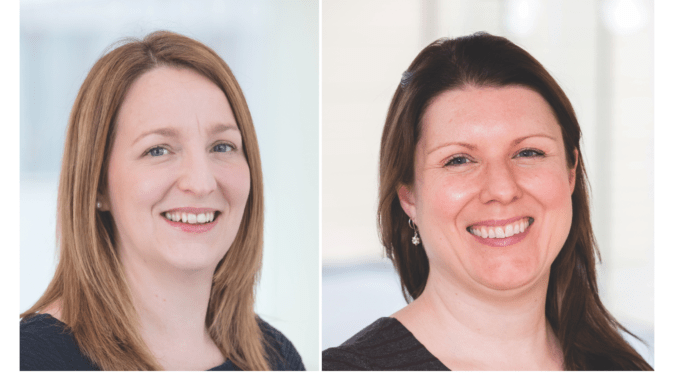
Say the words ‘legal innovation’ and Big Law firms often come to mind. But, the reality is that the firms genuinely focused on innovation and leveraging legal tech to improve how they deliver legal services is a rapidly widening group, and far beyond just the massive global firms.
Artificial Lawyer spoke to a trio of innovators at independent UK law firm, Burges Salmon, which has in total 750 staff, about what they are doing. The firm turned out to be every bit as innovative as many of its much larger peers.
Emma Sorrell (pictured above left), who is a lawyer by background and now Senior Innovation Specialist in the multi-disciplinary Business Solutions team at the firm, explained that she focuses on ‘how to promote advanced tech in the firm’.
They don’t have the resources of a billion dollar law firm, but that hasn’t stopped Burges Salmon creating a range of digital solutions that really add value for its clients. Earlier this year they also held a ‘B-Innovative Week’ to promote change. This included coding workshops where people could learn some basic Python to help them understand some of the technical aspects behind the tech on the market and in use at the firm.
Sorrell noted that when it comes to the implementation of new tech ‘we don’t have a room full of people to do the coding, instead we focus on low code platforms and working with tech providers’.
For example they work with document automation company, Clarilis, which provides a high level of human support.
Rachael Waring (pictured above right), who is a Senior Development Lawyer and sits in in the firm’s Disputes team, helps to shape the team’s strategy and also pricing strategy, and this includes taking an innovative approach.
‘One of my hats is keep an eye on tech,’ she explained and added they are looking at a range of tools, from ediscovery software, to litigation prediction systems, to pricing applications.
Waring notes however that any software that needs the lawyers to populate databases to make it work may possibly be a challenge.
Overall, she is optimistic, in part because of the firm’s culture.
‘We are fortunate, no matter where the partnership is, once there is a decision they all do it. It’s a very collaborative culture and people do go with decisions that are made,’ she said.
Tom Whittaker, an associate in the Disputes team, noted that they have explored hosting tech such as NLP data analysis platform BrainSpace in-house, but when it comes to ediscovery they look to collaborate with external providers to tap into their expertise and tailor the tech for each job.
The team also notes that when it comes to having ‘lawyers on demand’ they have built a great network of paralegals and alumni that can be brought in on a big project if they need them. This allows them to handle large review matters without the need for a permanent army of paralegals that bigger firms can keep.
Whittaker added that a key part of what the firm is doing is ‘getting people trained in legal project management.’ And this fits into the wider culture of change at the firm.
Sorrell also noted that the firm provides workshops for clients on areas such as process improvement.
‘We go in and map out the processes we do with them and look at the wider picture beyond that,’ she explained.
Overall, then, Burges Salmon is doing much of what far larger firms are doing. They are realistically adopting new tech where it’s useful. They are focused on process and project management, especially based on client needs. And they are making the best use of human talent in an agile way.
They are also using a significant level of new tech, including AI doc review solutions.
In fact, when asked about their views on various legal AI doc review systems in the market, the team quickly provided a series of insights that show a deep appreciation of the challenges and benefits of several products.
One well-known brand they said was a challenge because it didn’t have the kind of API integrations with other systems they expected. Some providers can also demand you pay extra for functionality in additional legal areas.
In short, this is a firm that is carefully and insightfully figuring out what they need – and what they don’t.
‘We are future-proofing the firm and shaping it to match what clients want,’ added Sorrell.
In conclusion, Burges Salmon is like a growing number of law firms around the world outside of the New York and City of London bubbles: diligently getting on with change and innovation projects, and embracing new tech and processes. They just don’t always get the same level of attention others receive.
This all bodes well for the legal market, and perhaps represents a ‘silent majority’ of medium to large law firms that are perhaps a lot further along the innovation journey than some may assume.
2 Trackbacks / Pingbacks
Comments are closed.